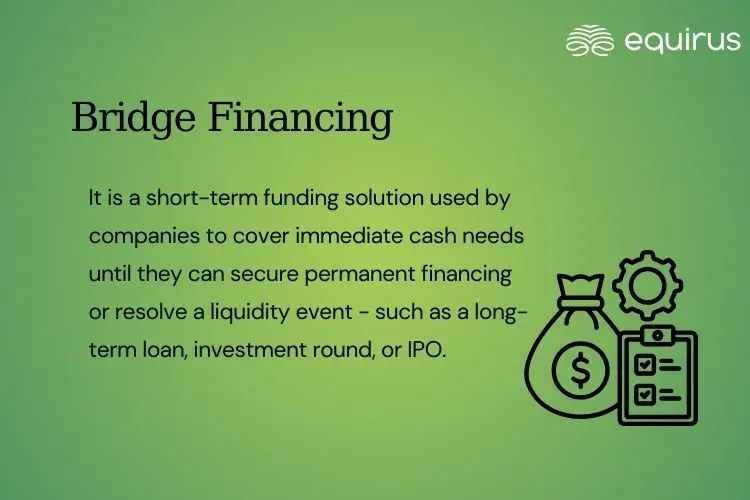Bridge Financing

Key Highlights
-
It is a short-term funding solution used by companies to cover immediate cash needs until they can secure permanent financing.
-
Key characteristics include sshort-term, high-interest rates, fast approval and collateralized or convertible.
What is Bridge Financing?
Bridge Financing (also called a Bridge Loan or Bridge Round) is a short-term funding solution used by companies to cover immediate cash needs until they can secure permanent financing or resolve a liquidity event—such as a long-term loan, investment round, or IPO.
It is called a "bridge" because it fills the gap between two financing events.
Key Characteristics
1. Short-term: Usually lasts from a few months up to a year.
2. High-interest rates: Higher than long-term loans due to increased risk and urgency.
3. Fast approval: Structured quickly to meet urgent capital needs.
4. Collateralized or convertible: Can be backed by assets or convertible into equity (in startups).
When Is Bridge Financing Used?
1. Before a larger funding round: Startups often raise bridge funding to maintain operations until the next equity round.
2. Before an IPO: Companies may raise funds to meet pre-listing expenses or boost working capital.
3. During M&A deals: Buyers may use bridge loans to quickly fund an acquisition while arranging longer-term financing.
4. To manage cash flow gaps: Companies with delayed receivables or seasonal business may use it to stay afloat.
Types of Bridge Financing
| Type | Description |
|---|---|
| Debt Bridge Loan | A short-term loan with fixed interest and repayment terms. |
| Convertible Bridge Note | A loan that converts into equity during the next funding round. |
| Equity Bridge Financing | Investors provide capital now for equity at a discounted price in a future round. |
Example
A startup expects to raise ₹10 crore in Series A funding in 6 months but needs ₹1 crore now to pay salaries and vendors. It raises a bridge round of ₹1 crore from existing investors via a convertible note—which will later convert into Series A shares at a 20% discount.
Benefits
-
Quick access to capital
-
Buys time before long-term funding
-
Flexibility in structuring (debt or equity)
-
Can prevent disruption in operations or growth
Risks and Considerations
-
High cost due to urgency and risk
-
Dilution risk if converted to equity
-
May pressure the company to close follow-on financing quickly
-
Not suitable as a long-term solution
Bridge Financing in the Indian Context
-
Used by startups before venture rounds via convertible debentures or SAFE notes
-
Companies approaching IPOs may use it to fund regulatory, marketing, or legal expenses
-
In real estate and infrastructure, bridge loans are used until banks release sanctioned funds
